ChatGPT Down for Exceeds 90 Minutes:Overwhelming Traffic
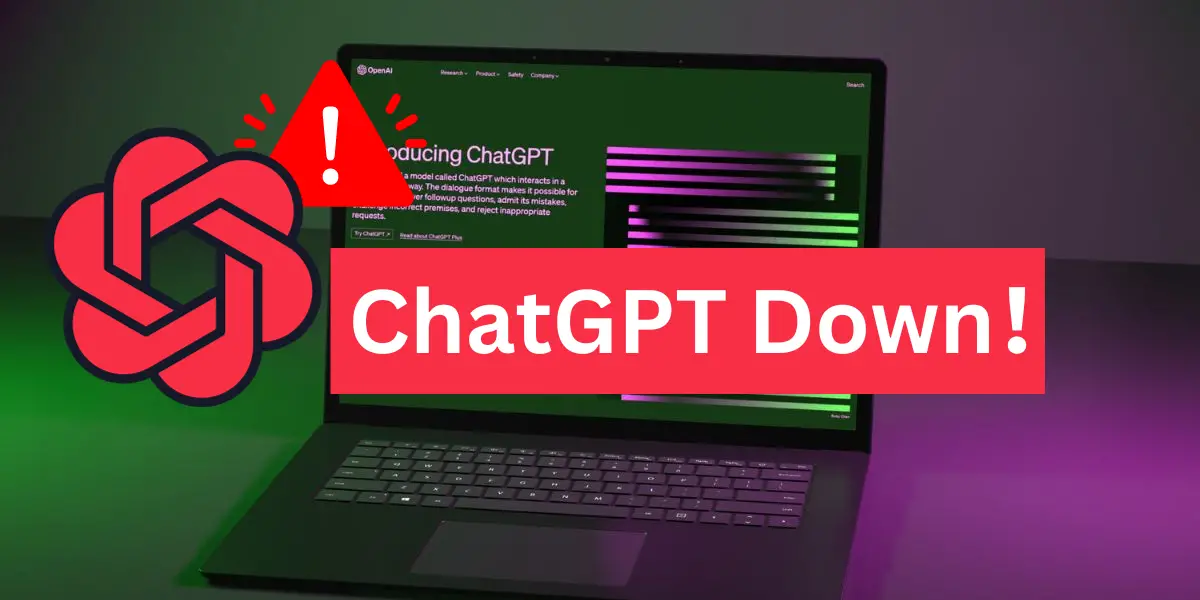
Hello, dear readers! I’ve got quite the tale to tell you today. Picture this: the OpenAI Developer Day, a veritable tech extravaganza that rocked the globe with its innovations, akin to a “Spring Festival Gala” of technology. But what happens when the party’s too lit? Well, it crashes—literally. ChatGPT and its APIs went down in a blaze of glory, marking what could be the grandest outage in history. But fret not, for this story has its twists, turns, and a dash of humor to boot.
Following the OpenAI Developer Day, ChatGPT suffered a complete collapse due to a surge in traffic, marking it as one of the most severe outages in history. Interactions with ChatGPT were problematic, and CEO Sam Altman personally apologized. The popularity of new features exceeded expectations, leading to service instability. The incident was declared a major outage, related to the launch of GPT-4 Turbo, customizable GPT, and the GPT store. Additionally, Claude also faced an outage, and there was a major update to the ChatGPT mobile app.
Table of Contents
After OpenAI DevDay: ChatGPT Experiences Overwhelming Traffic
In the wake of the OpenAI Developer Day, an event that dazzled the global tech community with its showcase of cutting-edge artificial intelligence, the company faced an unprecedented challenge. The overwhelming interest in the event’s announcements led to a surge in traffic that the servers could not withstand, causing a complete system collapse. This incident has been recorded as one of the most significant outages in the history of AI services, affecting both ChatGPT and its associated APIs.
The Developer Day was meant to be a celebration of OpenAI’s latest advancements, a testament to the company’s leadership in the field of AI. However, the fanfare quickly turned into a crisis management situation as services became inaccessible, leaving users worldwide unable to use ChatGPT for their various needs.
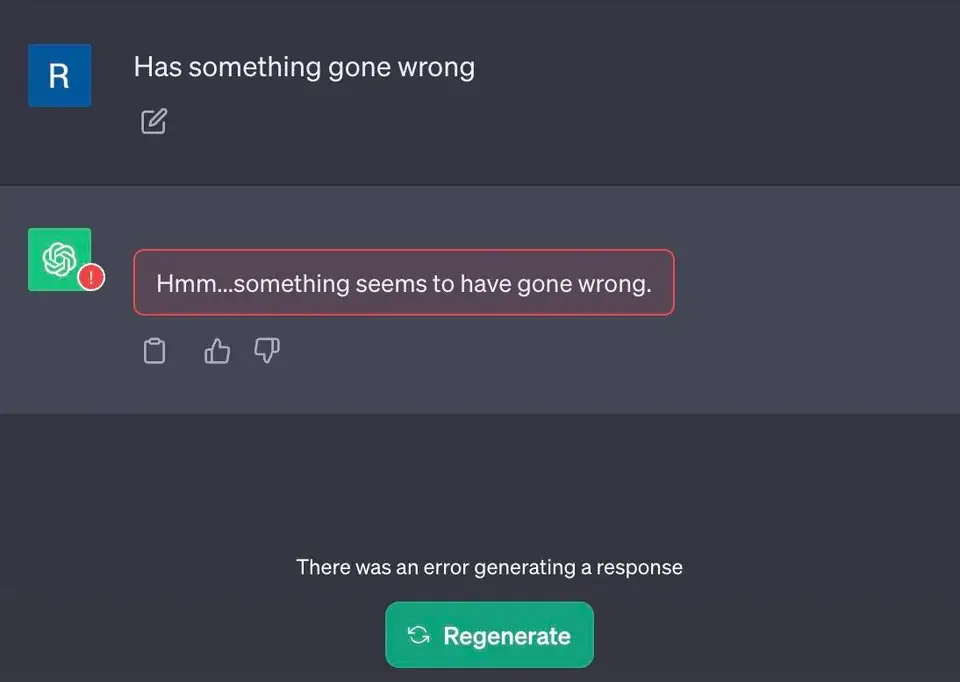
ChatGPT Down for Exceeds 90 Minutes
The issues began last night when users started to notice problems in their interactions with ChatGPT. The AI, known for its prompt and accurate responses, suddenly became unresponsive. The situation escalated quickly, and it became clear that this was not a minor hiccup but a significant outage.
OpenAI’s CEO, Sam Altman, stepped forward to address the issue personally. In his apology, he acknowledged that the enthusiasm for the new features had far exceeded the company’s expectations. The original plan was to roll out the latest generation of GPTs to all subscribers by Monday, but due to the unforeseen circumstances, this was not possible. Altman expressed a commitment to accelerating the progress to meet the high demand.
He also warned that due to the high load, there might be short-term instability in the service. The company extended its apologies to its user base for any inconvenience caused by this outage.
The apology and the acknowledgment of the issue were a part of OpenAI’s efforts to maintain transparency with its users. The company’s swift response to the outage, including ongoing updates on the situation, was an attempt to manage the expectations of its vast user base and reassure them that efforts were being made to restore services as quickly as possible.
The incident has highlighted the challenges that come with managing and scaling advanced AI systems in the face of rapidly growing user demand. OpenAI’s experience serves as a reminder of the importance of robust infrastructure and contingency planning in the ever-evolving landscape of technology.
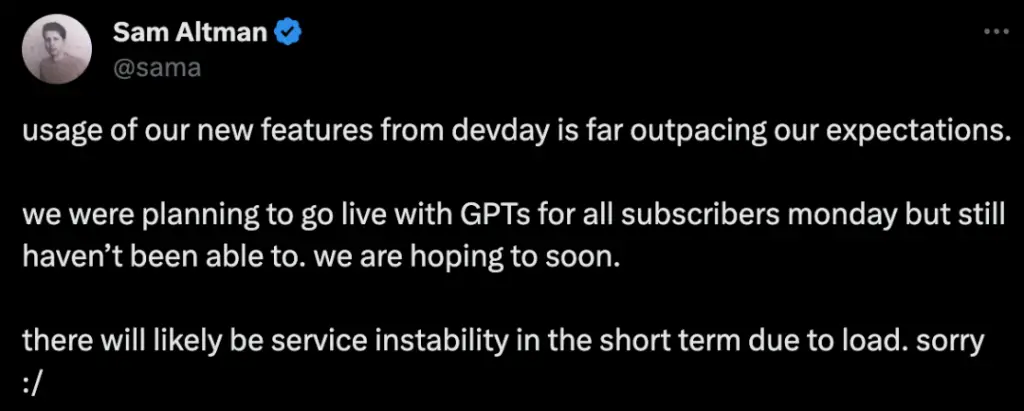
OpenAI Declares This Incident a Major Outage
OpenAI, in an official statement, marked the recent service interruption as a major outage, a classification that underscores the severity of the incident. The company issued what is colloquially known as a “red card warning” not once, but twice in quick succession, signaling the critical nature of the event. This level of alert is rare and indicates a significant disruption to services.
The outage triggered an immediate and intensive investigation by OpenAI’s engineering team. After an hour of rigorous analysis, the company updated its incident report, pinpointing a high error rate in both the API and ChatGPT. Users across various platforms voiced their frustrations, with many encountering the message “ChatGPT is at capacity right now,” a clear indication that the system was overwhelmed by the volume of requests.
Approximately 40 minutes after identifying the root cause, OpenAI announced that service had been restored. This rapid recovery was a testament to the team’s preparedness and ability to respond to critical issues, despite the complexity of the systems involved.
It’s worth noting that this was not the first time OpenAI had faced such challenges. Similar incidents occurred in March and August of the same year, with downtimes of 12 and 3 hours, respectively. However, the causes were different; for instance, the March outage was attributed to a failed database migration.
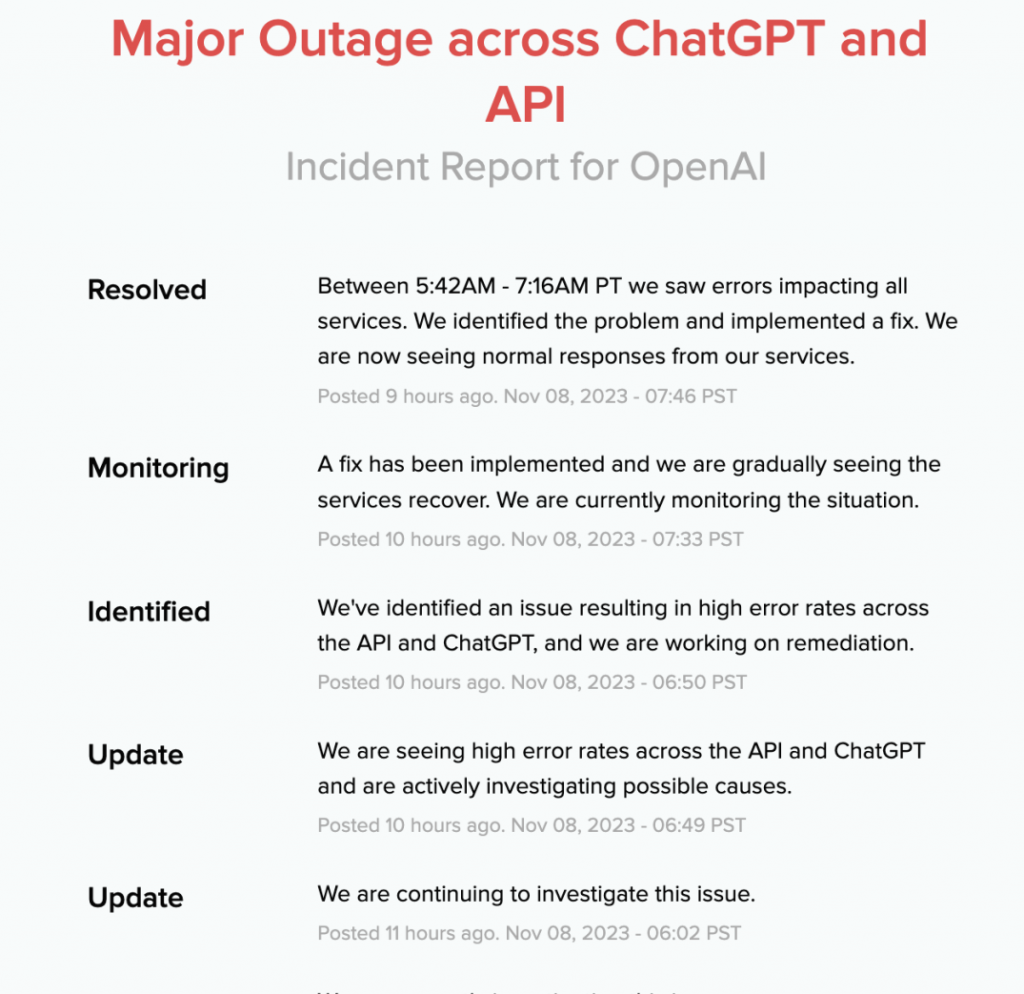
GPT-4 Turbo, Customizable GPT, and GPTs Go Live
The outage coincided with the launch of several new products from OpenAI, including GPT-4 Turbo, Customizable GPT, and the GPT store. These offerings represent significant advancements in the field of AI and have been highly anticipated by the tech community.
GPT-4 Turbo is an enhanced version of the already powerful language model, boasting the ability to process 128k tokens of context, equivalent to reading about 300 pages of text in one go. Its knowledge base is updated to as recent as April of the current year, making it one of the most advanced AI models available.
The Customizable GPT feature allows users to create a GPT with specialized skills in less than three minutes, without any need for programming. These custom models can then be sold in the GPT store, democratizing the development and monetization of AI technology.
These launches put a significant strain on OpenAI’s computational and server resources. The company’s infrastructure faced a stern test as it grappled with the dual challenges of deploying new features and managing an existing user base that CEO Sam Altman revealed to be over a hundred million weekly users, with more than two million developers utilizing the API services.
The incident has brought to light the scalability challenges that come with rapid innovation in AI. As OpenAI continues to push the boundaries of what’s possible, ensuring the stability and reliability of their services remains a top priority
Netizens Collectively Having a Massive Online Breakdown
The brief but intense outage of OpenAI’s services didn’t just disrupt the functionality of ChatGPT—it also sent shockwaves through the online community, leading to a collective breakdown among netizens. The internet, known for its resilience and humor in the face of adversity, quickly filled with colorful commentary and memes that captured the mood of the moment.
One anecdote that vividly encapsulated the chaos came from the imagined perspective of a startup CEO whose operations were entirely dependent on OpenAI’s technology:
“Hello? Is this OpenAI? You’re down, and now we can’t work either!”
The fictional boss continued to rant:
“The whole company is at a standstill, and you folks seem to not care at all!”
While this was just a jest, it wasn’t far from the truth for some. During the hours of the outage, many users took to social media to voice their genuine frustrations.
For instance, some lamented their inability to work, with one user humorously complaining:
“Great, now I have to type emails by hand 😭.”
On the flip side, there were those who found a silver lining, expressing joy at the unexpected break:
“Big outage!!! Time to chill and catch up on Netflix 😄.”
And then there were those who found alternatives, with Google’s Bard suddenly thrust into the spotlight as a stand-in. One user’s first-time experience with Bard was bittersweet:
“Because ChatGPT was down, I gave Google Bard a try. Honestly, it’s pretty good, but the tone is different from ChatGPT, a bit hard to understand.”
If Bard could respond, it might just quip back with a “Are you being polite?”
Although the outage led to a plethora of dramatic and entertaining episodes among the online community, it also highlighted just how integral ChatGPT has become to people’s daily work and life routines.
As Sam Altman mentioned, the full suite of new GPTs’ capabilities will soon be available to the public. The question on everyone’s mind is whether OpenAI will be able to handle the deluge of traffic that’s sure to come, and what creative value the users will bring to the table with these new tools. There’s a palpable sense of anticipation for what’s to come.
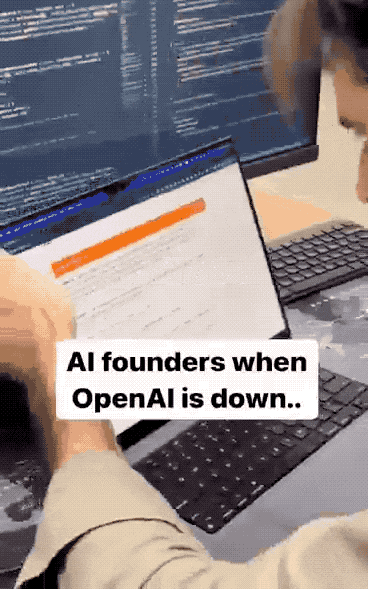
Claude Also Experienced an Outage
In a twist of fate, it wasn’t just ChatGPT that found itself in digital dire straits—Claude, another AI service, also experienced an outage. This simultaneous downtime across multiple AI platforms raised eyebrows and questions about the robustness of the infrastructure supporting these advanced technologies. Users who had turned to Claude as an alternative during ChatGPT’s downtime were met with the same frustrating reality: a service interruption that mirrored the one they hoped to escape. This incident served as a reminder of the interconnectedness of AI services and the cascading effects that issues in one part of the ecosystem can have on the whole.
Major Mobile Update for ChatGPT
Amidst the chaos, there was a beacon of progress. ChatGPT’s mobile application received a significant update, a leap forward in functionality that users had been eagerly awaiting. With this update, the app now allows users to seamlessly browse the web, analyze data, and even generate images without the need to switch between modes or applications. This enhancement represents a stride toward a more integrated and fluid user experience, where the power of AI can be harnessed directly from one’s smartphone, making the technology more accessible and versatile than ever before.
Final Thoughts
The recent outages of ChatGPT and Claude have been a wake-up call for the AI industry. They’ve shown that while AI technology has become an indispensable part of our daily lives, it is not infallible. The dependency on such technologies is a double-edged sword; it offers unprecedented convenience and capabilities but also introduces vulnerabilities that can have widespread impacts.
As we move forward, the lessons learned from these outages will undoubtedly inform future developments. Infrastructure will be bolstered, redundancies will be built, and contingency plans will be refined. The march of progress in AI will continue, but with a renewed focus on stability and reliability.
For users, the excitement for what’s to come remains high. The potential of AI to revolutionize our work and personal lives is immense, and despite the hiccups, the future looks bright. The integration of AI into mobile platforms is just the beginning, and as we look to the horizon, we can expect a world where AI is not just a tool but a trusted partner in our daily endeavors.

